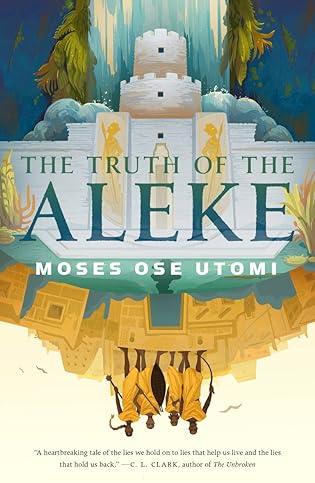 The Truth of the Aleke (Forever Desert, #2) by Moses Ose Utomi
The Truth of the Aleke (Forever Desert, #2) by Moses Ose Utomi Format: eARC
Source: supplied by publisher via Edelweiss
Formats available: hardcover, ebook
Genres: epic fantasy, fantasy
Series: Forever Desert #2
Pages: 112
Published by Tordotcom on March 5, 2024
Purchasing Info: Author's Website, Publisher's Website, Amazon, Barnes & Noble, Kobo, Bookshop.org, Better World Books
Goodreads
Moses Ose Utomi returns to his Forever Desert series with The Truth of the Aleke, continuing his epic fable about truth, falsehood, and the shackles of history.
The Aleke is cruel. The Aleke is clever. The Aleke is coming. 500 years after the events of The Lies of the Ajungo, the City of Truth stands as is the last remaining free city of the Forever Desert. A bastion of freedom and peace, the city has successfully weathered the near-constant attacks from the Cult of Tutu, who have besieged it for three centuries, attempting to destroy its warriors and subjugate its people.
17-year-old Osi is a Junior Peacekeeper in the City. When the mysterious leader of the Cult, known only as the Aleke, commits a massacre in the capitol and steals the sacred God's Eyes, Osi steps forward to valiantly defend his home. For his bravery he is tasked with a tremendous responsibility—destroy the Cult of Tutu, bring back the God's Eyes, and discover the truth of the Aleke.
The Forever Desert series
The Lies of the AjungoThe Truth of the Aleke
At the Publisher's request, this title is being sold without Digital Rights Management Software (DRM) applied.
My Review:
Returning to the Forever Desert long after the events of The Lies of the Ajungo, it seems as if the pendulum of history has swung, the way that such pendulums often do.
Once upon a time, and we know this from that first story, the Ajungo had subjugated all the other cities of the Forever Desert through a mixture of lies and trickery, intimidation and fear. At least until young Tutu exposed the terrible truth at the heart of, not just the Ajungo, but of all the leaders of all the cities who had colluded in that lie in order to maintain their absolute power over their own peoples with the all too able assistance of the Ajungo.
As this story begins, it seems as if that tide has reversed, that the former capital of the Ajungo, who now refer to themselves as Truthseekers and call their city ‘The City of Truth’, have themselves become the oppressed, while the people they once subjugated, the people of the Forever Desert, have banded together into an alliance of aggression against them led by the Aleke.
It is a way that history runs, that the downtrodden rise up against their oppressors but become oppressors in their turn. So we think we understand the situation in the City of Truth when the Aleke come to conquer it, and we feel for young Osi as he becomes the face of his city’s resistance against a terrible enemy.
But just as young Tutu discovered in The Lies of the Ajungo, the truths of both his City of Truth AND The Truth of the Aleke are not what he had been taught as a child. Or what he came to believe as a young man. Or even what he thought was true when he became an ambassador between the two.
Tutu died for his truth. The question at the heart of The Truth of the Aleke is whether or not Osi will be able to live both for and with his.
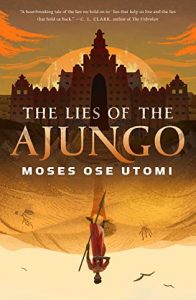 Escape Rating A+: Read The Lies of the Ajungo first. It’s a short and absolutely marvelous story of a quest that turns into a myth, and it’s absolutely necessary to read it in order for this equally terrific and fantastic (in multiple senses of the word) second book to reach the depth it needs to in order to get the full effect of the whole thing – at least the whole thing so far.
Escape Rating A+: Read The Lies of the Ajungo first. It’s a short and absolutely marvelous story of a quest that turns into a myth, and it’s absolutely necessary to read it in order for this equally terrific and fantastic (in multiple senses of the word) second book to reach the depth it needs to in order to get the full effect of the whole thing – at least the whole thing so far.
(I’ll be waiting right here when you’ve finished. It won’t take long because the book is short AND I hope you’ll want to race through it as much as I did.)
The Truth of the Aleke is a story that exists on multiple levels in ways that have resonance, both in the story itself and in the now when I’m reading it (It’s mid-October, 2023 so take a look at what was going on in the world at this point in time if the date doesn’t ring any bells and you’ll see what I mean) It’s likely to have just as much resonance in the now when you’re reading this review as that situation has been baked in for even more centuries than the conflict in the Forever Desert and is unfortunately just as amenable to being peacefully resolved – meaning not very much at all.
At first, it seems as if Osi’s journey parallels Tutu’s, and it does to an extent. Both young men – and they are very young and naive when their stories begin – have grown up in a certain place and have been taught to believe certain things and believe that those things are true because that’s the only way they know.
But power corrupts, absolute power corrupts absolutely and everybody lies. That the truth Osi has been taught is not in any way an objective truth is not a surprise to the reader, but the way that he discovers his new truth is a painful stripping away of innocence that we still feel for.
What pushes The Truth of the Aleke beyond The Lies of the Ajungo is that the truths that Osi has to learn are covered in so many layers of lies that the lies and the truths are really the Great Wyrm Ouroboros swallowing its own tail and never end. It’s truths and lies in endless repetition all the way down.
The more layers that Osi discovers, or has thrust upon him – and he admits to himself that he often doesn’t recognize the truth until AFTER it’s bitten him in the ass – the more painful his journey becomes, both figuratively and literally. It’s only at the end that he begins to see, not wisdom but pragmatism. Unless there’s another layer yet to be revealed.
And there probably is.
Some stories are about the journey, and some are about the destination. The Truth of the Aleke has to be about the journey – and it is – because the destination is not yet. If possibly ever. It’s clear from the conclusion – not an ending – of The Truth of the Aleke that the author is not finished with the Forever Desert and that there is at least one more story yet to be told and I’m so very thrilled that the author is already writing it.

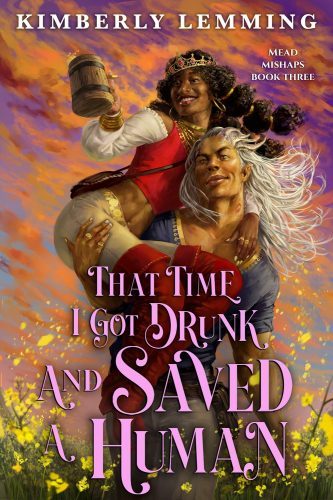 That Time I Got Drunk and Saved a Human (Mead Mishaps, 3) by
That Time I Got Drunk and Saved a Human (Mead Mishaps, 3) by 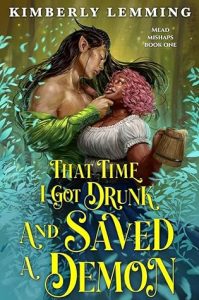 Which is the story of Cherry’s current life when the story begins. Because yes, that’s Cherry Hotpepper, the missing and presumed dead sister of the heroine of the place where this whole thing started in
Which is the story of Cherry’s current life when the story begins. Because yes, that’s Cherry Hotpepper, the missing and presumed dead sister of the heroine of the place where this whole thing started in 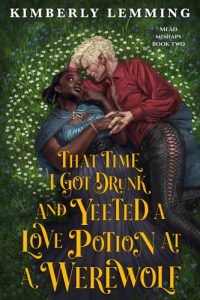 Escape Rating B: In the end, I enjoyed this nearly as much as I did the previous books in the series,
Escape Rating B: In the end, I enjoyed this nearly as much as I did the previous books in the series, 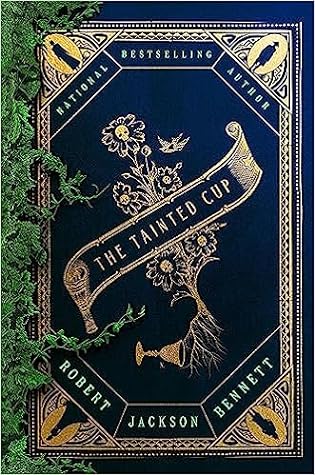 The Tainted Cup (Shadow of the Leviathan, #1) by
The Tainted Cup (Shadow of the Leviathan, #1) by 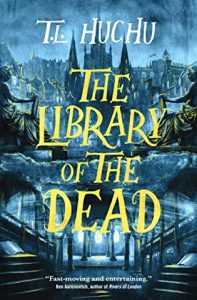 Escape Rating A+: There’s been a rise in science fiction mysteries in the last couple of years, with books like Mur Lafferty’s
Escape Rating A+: There’s been a rise in science fiction mysteries in the last couple of years, with books like Mur Lafferty’s 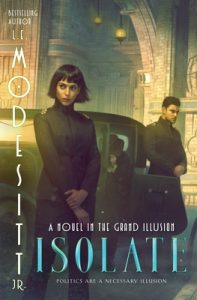 But the setting of The Tainted Cup, and the epically FUBAR political situation therein, is very much fantasy of both the grimdark and steampunk varieties. The world, with its mixture of science and magic and scientifically based magic is similar to the setting of L.E. Modesitt’s
But the setting of The Tainted Cup, and the epically FUBAR political situation therein, is very much fantasy of both the grimdark and steampunk varieties. The world, with its mixture of science and magic and scientifically based magic is similar to the setting of L.E. Modesitt’s 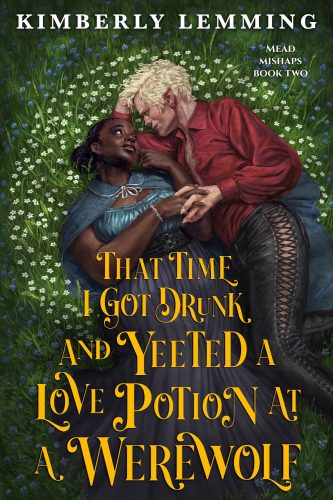 That Time I Got Drunk and Yeeted a Love Potion at a Werewolf (Mead Mishaps, 2) by
That Time I Got Drunk and Yeeted a Love Potion at a Werewolf (Mead Mishaps, 2) by 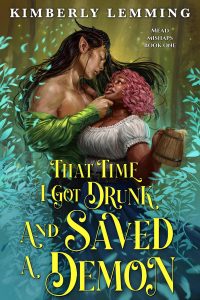 I just started in the middle, didn’t I? That’s actually kind of apropos, as That Time I Got Drunk and Yeeted a Love Potion at a Werewolf is the second or even more on point, the middle book in the
I just started in the middle, didn’t I? That’s actually kind of apropos, as That Time I Got Drunk and Yeeted a Love Potion at a Werewolf is the second or even more on point, the middle book in the 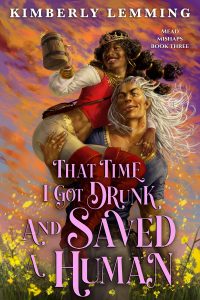 And just like in the previous book, and just as much fun as that first time around, this second cozy fantasy with sexytimes combines (frequently and often but not nearly as frequently and often as either Felix or Brie REALLY want) two tastes that go really GREAT together. There’s a surprisingly sweet romance between a girl who wants to do the right thing even if kills her and a werewolf who is sure that what they are doing IS the right thing if only she’d stop worrying about the love potion – at least right up until the point he realizes that he really, Really, REALLY should have worried a bit more about the love potion. And on the other hand, the need to foil a terrible plot to fill the worldwide vacancy in the deity department with a new face slapped on the same old trickster.
And just like in the previous book, and just as much fun as that first time around, this second cozy fantasy with sexytimes combines (frequently and often but not nearly as frequently and often as either Felix or Brie REALLY want) two tastes that go really GREAT together. There’s a surprisingly sweet romance between a girl who wants to do the right thing even if kills her and a werewolf who is sure that what they are doing IS the right thing if only she’d stop worrying about the love potion – at least right up until the point he realizes that he really, Really, REALLY should have worried a bit more about the love potion. And on the other hand, the need to foil a terrible plot to fill the worldwide vacancy in the deity department with a new face slapped on the same old trickster. Demon Daughter (Penric and Desdemona #12) by
Demon Daughter (Penric and Desdemona #12) by 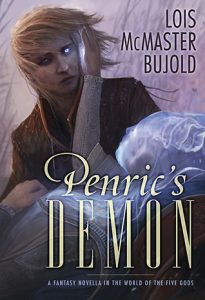 Demon Daughter – not Demon’s Daughter because that would be a different genre altogether – is a delightfully cozy entry in the
Demon Daughter – not Demon’s Daughter because that would be a different genre altogether – is a delightfully cozy entry in the 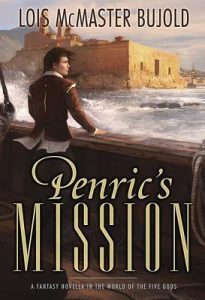 Which is exactly what happens in Demon Daughter, in a roundabout sort of way. The chaos at least.
Which is exactly what happens in Demon Daughter, in a roundabout sort of way. The chaos at least.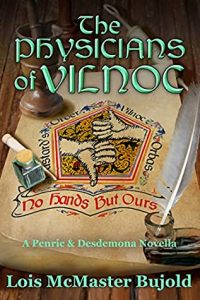 Escape Rating A: This twelfth entry in the
Escape Rating A: This twelfth entry in the 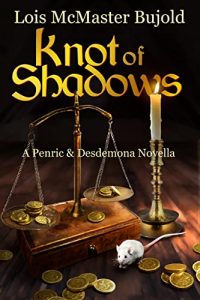 It’s those questions that stick in my mind after finishing Demon Daughter. Because there are entirely too many people in the real world who face that dilemma every day while trying to live their truth even though they’ve been taught by family, faith and community that their truth is a lie.
It’s those questions that stick in my mind after finishing Demon Daughter. Because there are entirely too many people in the real world who face that dilemma every day while trying to live their truth even though they’ve been taught by family, faith and community that their truth is a lie.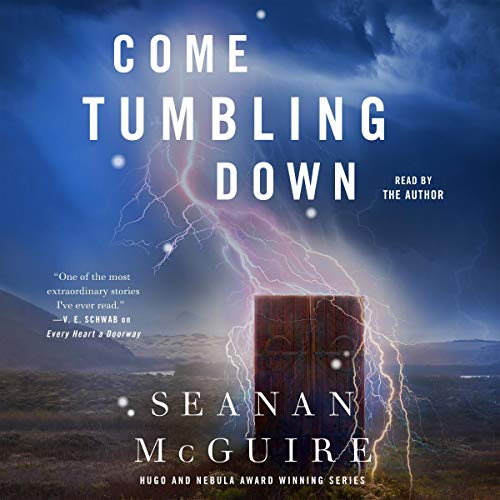 Come Tumbling Down (Wayward Children, #5) by
Come Tumbling Down (Wayward Children, #5) by 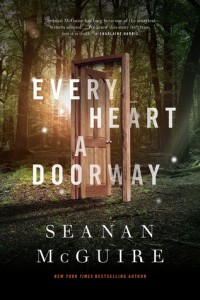 I’ve been winding my way through Seanan McGuire’s
I’ve been winding my way through Seanan McGuire’s 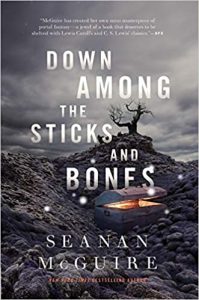 Jack is in dire straits when she returns to the school, and she needs the help of the only friends she can trust to see that, in spite of appearances, she’s still Jack even though she’s in her twin sister Jill’s body. They are the only people who know her well enough to understand that her OCD will not allow her to just adapt to living her life in the unclean thing that murdered her mentor – even if Jill’s full, entire, complete and utterly nefarious plot is to destroy both her sister Jack and the balance that keeps The Moors relatively safe and functional for the human population that was born to a world where vampires contend with mad scientists and drowned gods prey upon ships and shorelines, where the sun only rises behind thick clouds and lightning storms happen whenever the Moon wills it so.
Jack is in dire straits when she returns to the school, and she needs the help of the only friends she can trust to see that, in spite of appearances, she’s still Jack even though she’s in her twin sister Jill’s body. They are the only people who know her well enough to understand that her OCD will not allow her to just adapt to living her life in the unclean thing that murdered her mentor – even if Jill’s full, entire, complete and utterly nefarious plot is to destroy both her sister Jack and the balance that keeps The Moors relatively safe and functional for the human population that was born to a world where vampires contend with mad scientists and drowned gods prey upon ships and shorelines, where the sun only rises behind thick clouds and lightning storms happen whenever the Moon wills it so. Escape Rating A-: The
Escape Rating A-: The 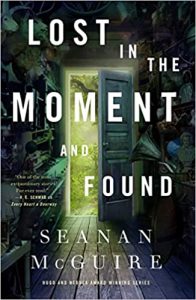 One of the core tenets of the whole, entire,
One of the core tenets of the whole, entire, 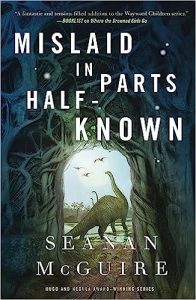 So, on the surface there’s a story about vampires and mad scientists set in a place that the great horror movies might have used for their inspiration – if not their actual setting. Underneath that there’s a deeper story about balances of power and how devastating it can be when those balances become unbalanced. And the story of one heroine who is willing to throw her own body into the breach – along with her sister’s corpse – to preserve that balance at truly any and every cost.
So, on the surface there’s a story about vampires and mad scientists set in a place that the great horror movies might have used for their inspiration – if not their actual setting. Underneath that there’s a deeper story about balances of power and how devastating it can be when those balances become unbalanced. And the story of one heroine who is willing to throw her own body into the breach – along with her sister’s corpse – to preserve that balance at truly any and every cost.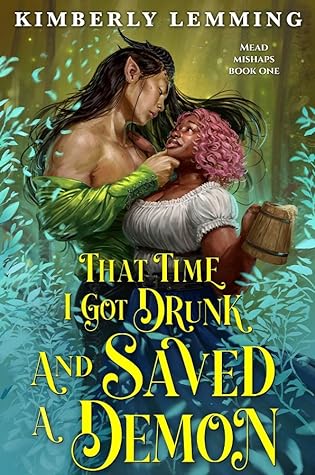 That Time I Got Drunk and Saved a Demon (Mead Mishaps, #1) by
That Time I Got Drunk and Saved a Demon (Mead Mishaps, #1) by 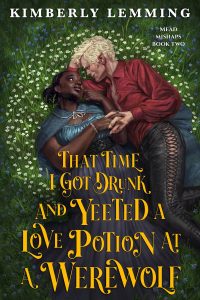 The hard part of that journey, in so many senses of the word, many of which are played for salacious titters to VERY good effect, is the progress of the romance between the demon Fallon and the Spice Girl (literally, Cin’s full name is Cinnamon, she grows cinnamon on her family’s spice farm). It’s clear to everyone except Cin that Fallon is all in on their relationship – if not yet into all of Cin’s private places – from the moment they meet. Cin’s the one who needs some convincing – not about whether she and Fallon set each other on fire – but whether his fire and her desire to never get burned again have a chance at a future.
The hard part of that journey, in so many senses of the word, many of which are played for salacious titters to VERY good effect, is the progress of the romance between the demon Fallon and the Spice Girl (literally, Cin’s full name is Cinnamon, she grows cinnamon on her family’s spice farm). It’s clear to everyone except Cin that Fallon is all in on their relationship – if not yet into all of Cin’s private places – from the moment they meet. Cin’s the one who needs some convincing – not about whether she and Fallon set each other on fire – but whether his fire and her desire to never get burned again have a chance at a future.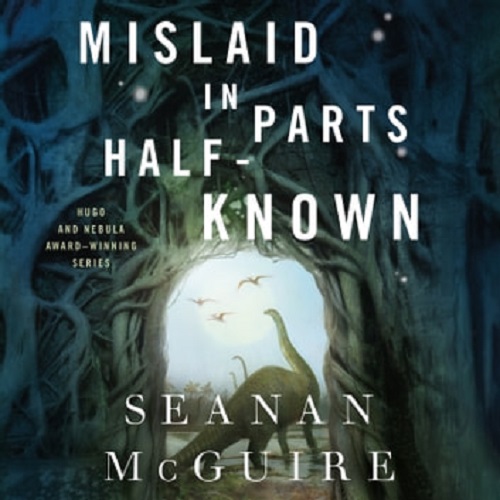 Mislaid in Parts Half-Known (Wayward Children, #9) by
Mislaid in Parts Half-Known (Wayward Children, #9) by  Beginning with
Beginning with 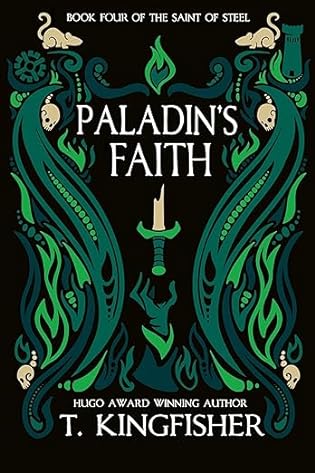 Paladin's Faith (The Saint of Steel, #4) by
Paladin's Faith (The Saint of Steel, #4) by 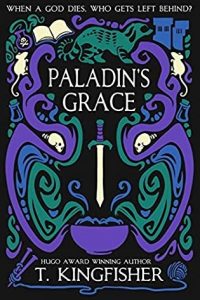 There’s a classic saying about large organizations at cross-purposes within themselves, that the right-hand doesn’t know what the left hand is doing. Marguerite Florian’s problem with the Red Sail mercantile empire is that their “right hand does not know who the left is killing”.
There’s a classic saying about large organizations at cross-purposes within themselves, that the right-hand doesn’t know what the left hand is doing. Marguerite Florian’s problem with the Red Sail mercantile empire is that their “right hand does not know who the left is killing”.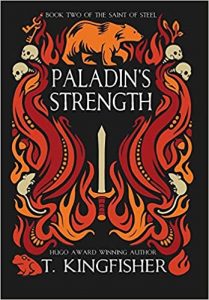 Marguerite just has to stay alive long enough to find the artificer. For that, she’ll need bodyguards who can’t be bribed or bought, seduced or suborned. She needs a paladin – or two.
Marguerite just has to stay alive long enough to find the artificer. For that, she’ll need bodyguards who can’t be bribed or bought, seduced or suborned. She needs a paladin – or two.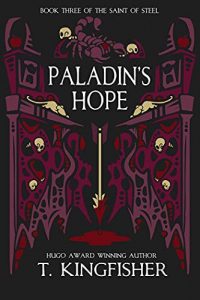 Howsomever, by the nature of that waiting game a LOT of this story is extremely interesting character development with a fair bit of adding to the depth of the worldbuilding but one does, like one of the side characters, Davith, want them to just ‘get on with it’ one way or another, either to get a move on in their mission or just make a move on each other.
Howsomever, by the nature of that waiting game a LOT of this story is extremely interesting character development with a fair bit of adding to the depth of the worldbuilding but one does, like one of the side characters, Davith, want them to just ‘get on with it’ one way or another, either to get a move on in their mission or just make a move on each other.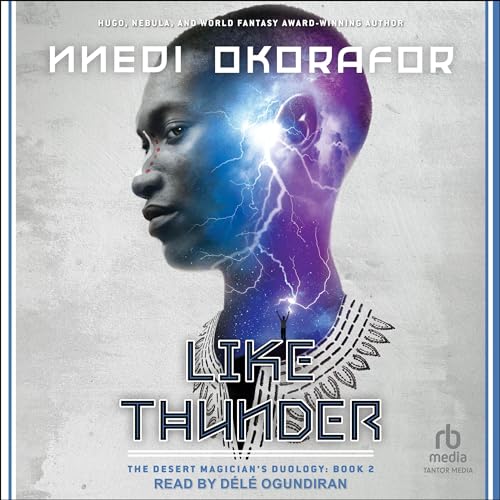 Like Thunder (The Desert Magician's Duology #2) by
Like Thunder (The Desert Magician's Duology #2) by  Escape Rating A-: As much as I loved
Escape Rating A-: As much as I loved